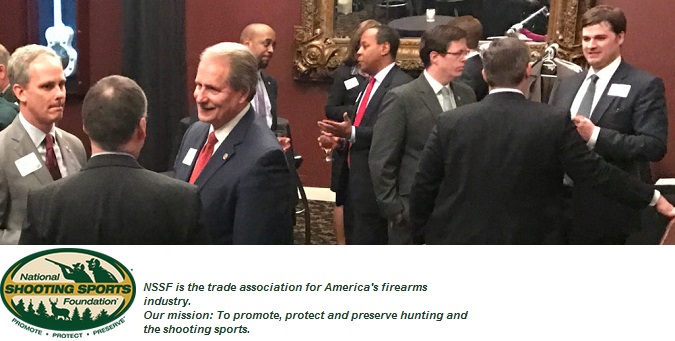NSSF members met with more than 40 Tennessee state legislators at a reception in Nashville Wednesday and were reassured that the Volunteer State is open for business with the firearms industry. NSSF members attending included Pilkington Competition Equipment, Exceed Sports and Outdoors and Davis Firestix.

“Tennesseans are sportsmen and gun enthusiasts,” said state Sen. John Stevens (R-Huntingdon). “We are proud to have our partners in the firearms industry in our state. Their investment in our communities provides not only jobs but they also provide their employees the opportunity to put pride in their product, know they are producing something that is part of the fabric of their life.”
Tennessee lawmakers cited two example of their pro-gun attitude. First, Beretta USA moved its production to Gallatin after the company’s announcement that it would leave Maryland following that state’s adoption of strict gun control legislation in 2013. Last year, Tennessee named the homegrown Barrett M82A1 .50-caliber rifle as its official state rifle.
“We’re proud to have both of them here,” Tennessee Speaker of the House Beth Harwell (R-Nashville) said. “They are making quality products and employing Tennesseans. We’re honored they came here. Our state legislature is not only very pro-business, we’re respectful of Second Amendment rights.”
In fact, Tennessee’s pro-gun business environment enabled the industry to create more than $1.03 billion in total economic impact and more than 6,800 jobs. Not all those jobs are tied to major manufacturers. Many are the result of small-business owners.
“We have a lot of locally-owned shops,” Speaker Harwell said. “In Tennessee, we’re very proud of those small-business owners who make it possible for Tennesseans to hunt, shoot and protect themselves.”
Scott Pilkington, owner of Pilkington Competition Equipment, is one of those small business owners. He provides competition airguns to U.S. Olympic Team members, NCAA rifle teams, high school JROTC teams and is the sole U.S. manufacturer of match grade airgun pellets.
“It’s always good to interact with legislators,” Pilkington explained. “This is a great opportunity. It doesn’t hurt to put the numbers in front of the lawmakers to show them this is our economic impact.” Pilkington said he’s been working with state agencies to establish an Olympic shooting museum and range in Monteagle.
State Rep. Jay Reedy (R-Erin), co-chair of the Tennessee Legislative Sportsmen’s Caucus, said Tennessee is actively seeking more industry members businesses to call the Volunteer State home. “With the announcement of Berretta coming here, we were able to show the American public we respect the industry as well as the shooting sports,” Reedy said. “The state of Tennessee is open for business.”
Fellow Sportsmen’s Caucus co-chair, state Sen. Mike Bell (R-Riceville) added he’s optimistic for the future of the industry in the state. “We’ve got a new ammunition company in in Cleveland (Tenn.). It’s a start-up and employs 50 people,” Bell said. “We’re excited to see even small companies come here and we’re hoping more companies will move this way.”
Sen. Bell had his own good news for NSSF members. The state Senate Judiciary Committee, on which he sits, approved the Tennessee Hearing Protection Act of 2017, which would remove a “firearms silencer” from the list of weapons “having no common lawful purpose.”
State Sen. Bill Ketron (R-Murfreesboro) said there is more work to be done in the state to ensure the firearms industry is free from discrimination. He proposed Tennessee’s Firearms Industry Nondiscrimination Act, a piece of legislation that would end the practice of banks and payment processors from refusing to work with firearms-related businesses solely because they are involved in the gun industry. Sen. Ketron explained he’s witnessed this discrimination personally. He’s known Ronnie Barrett, founder of Barrett Firearms Manufacturing since high school. He watched him grow his business, supplying firearms to the U.S. military and was stumped when he found out his business wasn’t welcomed by his bank. The reason: he produced firearms.
|
|
|
|
|
